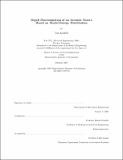Depth discrimination of an acoustic source based on modal energy distribution
Author(s)
Apelfeld, Yan
DownloadFull printable version (12.63Mb)
Other Contributors
Massachusetts Institute of Technology. Dept. of Mechanical Engineering.
Advisor
Henrik Schmidt.
Terms of use
Metadata
Show full item recordAbstract
The new method of acoustic source depth discrimination in a shallow water environment is investigated. The investigation is concentrated mainly in 500Hz and 1kHz sources in the range-independent and range-dependent environments. Efficiency and robustness of the method is studied and suggestions for the method's optimization are provided. The results of many simulation cases are presented and discussed. The results suggest that for the sources of 500Hz and 1kHz the depth discrimination method can provide an accurate estimate of the target's type: surface or submerged. The method can be useful for applications for which exact depth location is unnecessary and a target's category estimate is sufficient. The method is based on the fact that the modal energy distribution changes in accordance with a source depth category. Guidelines to achieve correct results are developed and presented. Method stability and robustness are examined. The range-independent case results suggest existence of 'shadow' areas where the standard method may provide a misleading depth estimate. Alternative methods are suggested to overcome the problem. The range-dependent case results suggest relatively poor performances of the method for a downslope environment. However, the upslope case results show superior performances than even in the range-independent case.
Description
Thesis (S.M. in Ocean Engineering)--Massachusetts Institute of Technology, Dept. of Mechanical Engineering, 2007. This electronic version was submitted by the student author. The certified thesis is available in the Institute Archives and Special Collections. Includes bibliographical references (leaves 150-151).
Date issued
2007Department
Massachusetts Institute of Technology. Department of Mechanical EngineeringPublisher
Massachusetts Institute of Technology
Keywords
Mechanical Engineering.